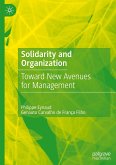Solidarity is an 'unthought' in the fields of organizational theory and management sciences. However, it is an increasingly important feature in the management of organizations. The contemporary world suffers from a double unsustainability: the abusive exploitation of natural resources endangers the balance of the climate and biodiversity, while growing inequalities condemn our ability to maintain a balanced society. These unsustainabilities are mutually reinforcing and call for the affirmation of a double solidarity, which unites humans among themselves, and links humans and nonhumans. Such an effort cannot be decreed. It must be organized.
Based on numerous grassroots initiatives and citizens' experimentations that are being invented every day around the world and on a historical and anthropological approach, this book explores different ways of combining solidarity and organization. Solidarity-based management, governance of the commons, and Buen Vivir approaches are some of the perspectives analyzed in the context of a North-South dialogue in order to formulate the conceptual framework and practical steps of a social and environmental transition. It offers both theoretical background and living examples to students, professors and researchers to better understand and better teach new avenues for management.
Based on numerous grassroots initiatives and citizens' experimentations that are being invented every day around the world and on a historical and anthropological approach, this book explores different ways of combining solidarity and organization. Solidarity-based management, governance of the commons, and Buen Vivir approaches are some of the perspectives analyzed in the context of a North-South dialogue in order to formulate the conceptual framework and practical steps of a social and environmental transition. It offers both theoretical background and living examples to students, professors and researchers to better understand and better teach new avenues for management.








